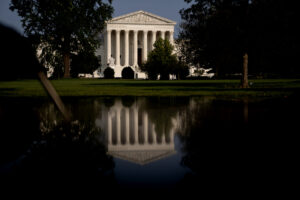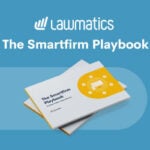The Supreme Court Is Lying To You About This Web Designer Opinion
This is gaslighting, plain and simple.

(Photographer: Stefani Reynolds/Bloomberg)
In 303 Creative, the Supreme Court ruled that a website designer — who had never even been asked to design a website for a same-sex wedding — could legally discriminate against same-sex couples based on her assertion that she doesn’t want to serve gay people. And, while she cited a religious objection, the majority pegged the case on free expression so a plaintiff merely has to not like the idea of serving a minority group to cast off anti-discrimination laws.
Happy Pride Month, everyone!

How Generative AI Is Disrupting Law Firm Billing Practices
How is there standing? Great question! The Court doesn’t care.
To clarify her rights, Ms. Smith filed a lawsuit in federal district court.
In other news…
Sponsored

The Smartfirm Playbook - Thriving In Today’s Legal Landscape

How to Achieve Quicker, More Valuable Case Settlements with Minimal Effort: A Guide for Personal Injury Lawyers

InterAction+ Brings Power Of CRM Software To Law Firms Of All Sizes

How to Achieve Quicker, More Valuable Case Settlements with Minimal Effort: A Guide for Personal Injury Lawyers
At least the lawyers didn’t try to go forward by wholly fabricating a same-sex couple’s request — but that appears to have been on the table!
As Justice Sotomayor notes in dissent, the majority’s opinion is wholly unmoored from constitutional precedent:
Yet for as long as public accommodations laws have been around, businesses have sought exemptions from them. The civil rights and women’s liberation eras are prominent examples of this. Backlashes to race and sex equality gave rise to legal claims of rights to discriminate, including claims based on First Amendment freedoms of expression and association. This Court was unwavering in its rejection of those claims, as invidious discrimination “has never been accorded affirmative constitutional protections.” Norwood v. Harrison, 413 U. S. 455, 470 (1973). In particular, the refusal to deal with or to serve a class of people is not an expressive interest protected by the First Amendment.
Once you make the choice to open a business to the public, you agree to abide by the rules. If you don’t want to do that, you don’t have to open a business. That’s been the law dating back to English common law — but apparently the majority has chosen a convenient time to junk its amateur historian antics.
Conservatives are scrambling to downplay the palpable outrage with a “nothing to see here” narrative. We’ll use this Tweet from the CATO Institute’s Walter Olson, but it really could be any of the Federalist Society crowd:
Sponsored

LawPay Pro Offers Upgraded Time And Billing Essentials

How Generative AI Is Disrupting Law Firm Billing Practices
This is wildly disingenuous and one doesn’t even need to look hard to figure out why. As the dissent notes, we’re just five years removed from the Supreme Court’s “limited” approval of bakery bigots. That majority also downplayed the extent of its ruling and its supporters told everyone that it was “bogus” to think it would extend to something like today’s ruling.
But they were lying.
As the dissent explains:
Five years ago, this Court recognized the “general rule” that religious and philosophical objections to gay marriage “do not allow business owners and other actors in the economy and in society to deny protected persons equal access to goods and services under a neutral and generally applicable public accommodations law.” Masterpiece Cakeshop, Ltd. v. Colorado Civil Rights Comm’n, 584 U. S. ___, ___ (2018) (slip op., at 9). The Court also recognized the “serious stigma” that would result if “purveyors of goods and services who object to gay marriages for moral and religious reasons” were “allowed to put up signs saying ‘no goods or services will be sold if they will be used for gay marriages.’ ” Id., at ___ (slip op., at 12).
This is how an incremental litigation strategy works! They started with the baker, now it’s the web designer. Tomorrow it’ll be a tailor. Or a theater venue. Or the lunch counter chef whose cuisine is her art.
Subway already employs “sandwich artists,” after all.
I mean, what is “art” anyway? The justices already proved they can’t figure it out in a fractured opinion this Term. Not that it even matters. While everyone shorthands this case as being about “art,” there’s nothing limiting a future plaintiff’s “expression” to something artistic. Under the First Amendment, expression is much broader than just art.
This is an asinine claim because “we’ll serve gay people as long as they don’t do anything noticeably ‘gay'” is simply not how discrimination law works. When a business provides some services but not all services to a minority, that’s still not cool. We can stipulate that the bus would’ve served Rosa Parks if she sat in the back too, but that doesn’t make it pass muster.
But French’s Tweet is also stupid because it puts way too much weight on the idea that this is “just about speech.” There is not much solace in the majority opinion that the “compelled speech” reasoning wouldn’t apply just as forcefully to a claim of “compelled association” (that’s an “expression” too!). It’s all the First Amendment at the end of the day. And once you get to association, you’re right back to “I don’t want them in my restaurant.”
Though that would probably be fine for French who would respond, “the state stipulated that they could get takeout.”
Even granting the most massive and undeserved benefit of the doubt to “Team Limited,” the argument ignores the indirect, chilling impact of the ruling. States will shy away from enforcing public accommodation laws over this — either out of fear of litigation or, in some cases, because the state government never wanted to enforce those laws in the first place and now have cover to wallow in their own crapulence.
The Supreme Court just the erected the next milestone on a return to Plessy v. Ferguson. It’s intellectually dishonest to read this opinion and claim that it doesn’t protect miscegenists from denying services to interracial couples or racists from just blanket refusing to build business websites for racial minorities because they don’t want to help them make money. And it’s just as dishonest to read this opinion in the context of Masterpiece and claim that the Court won’t eagerly push this further at the next opportunity.
You shouldn’t have believed these people after Masterpiece and you shouldn’t believe them today. In the words of the man who put some of these bad faith actors in office, “fool me once, shame on — shame on you. Fool me — you can’t get fooled again.”
303The Mysterious Case of the Fake Gay Marriage Website, the Real Straight Man, and the Supreme Court [The New Republic]
 Joe Patrice is a senior editor at Above the Law and co-host of Thinking Like A Lawyer. Feel free to email any tips, questions, or comments. Follow him on Twitter if you’re interested in law, politics, and a healthy dose of college sports news. Joe also serves as a Managing Director at RPN Executive Search.
Joe Patrice is a senior editor at Above the Law and co-host of Thinking Like A Lawyer. Feel free to email any tips, questions, or comments. Follow him on Twitter if you’re interested in law, politics, and a healthy dose of college sports news. Joe also serves as a Managing Director at RPN Executive Search.







